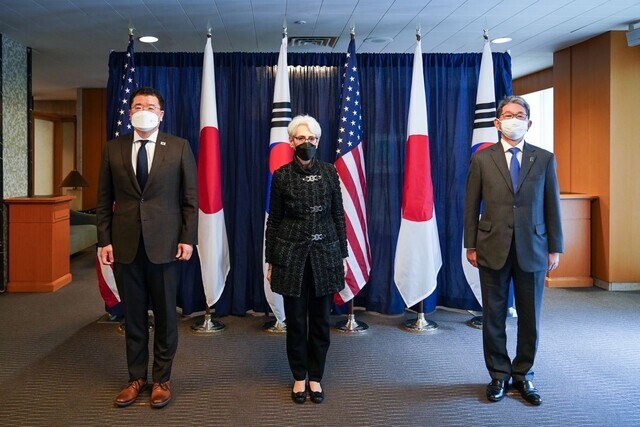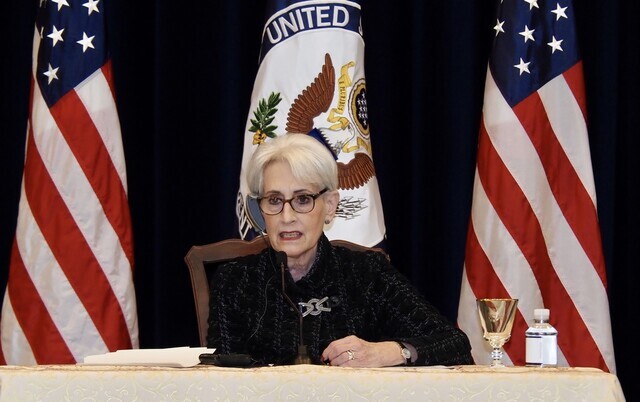hankyoreh
Links to other country sites 다른 나라 사이트 링크
Japan cites Dokdo dispute as reason for calling off joint press conference with S. Korea, US

After Korea’s national police chief visited the islets of Dokdo on Tuesday, a joint press conference planned for the vice foreign ministers of South Korea, the US and Japan fell through. The latest blast of cold air between Korea and Japan, who continue to tussle over historical grievances and territorial disputes, undermined the three countries’ efforts at cooperation.
South Korean First Vice Minister of Foreign Affairs Choi Jong-kun, US Deputy Secretary of State Wendy Sherman and Japanese Vice Minister for Foreign Affairs Takeo Mori were originally scheduled to hold a joint press conference at 2 pm following their trilateral meeting at the US State Department building on Wednesday. A joint press conference had also been held when the trilateral talks resumed in Tokyo in July, after a hiatus of four years.
But this time, an abrupt change of format left Sherman holding the press conference by herself. The Japanese informed her before the meeting began at 10 am that they wouldn’t take part in the joint press conference because they objected to Korean National Police Agency Commissioner General Kim Chang-yong’s visit to Dokdo.
Mori reportedly informed the Americans of Japan’s rationale for backing out of the press conference. Mori said his trip to Washington had nearly been called off because of discontent in the Japanese government over the Dokdo visit but that he’d persuaded his superiors to let the trip go ahead. However, the trilateral meeting and a separate bilateral meeting between Korea and Japan proceeded as planned.
Following the meetings, Choi was asked by reporters at the South Korean Embassy in Washington why the joint press conference had been called off.
“The Japanese conveyed to us before the trilateral meeting began that they couldn’t take part in the joint press conference while mentioning the visit to Dokdo by the commissioner general of Korean police,” Choi said.
“We agreed that the results of the trilateral meeting of vice foreign ministers could be disclosed through a separate press conference by the US, which had hosted the meeting. The agreement was based on our sense of the meeting’s importance.”
“The Japanese stated that if Japanese reporters asked questions about Dokdo, they were going to express the government’s position very forcefully. That would force us to reply that Dokdo is clearly Korean territory. The Americans were concerned that the joint press conference would be completely overshadowed by the Dokdo issue,” a senior official in the South Korean government told reporters.
“As has been the case for some time, there are some bilateral differences between Japan and the Republic of Korea that are continuing to be resolved, and one of those differences which is unrelated to today’s meeting has led to the change in format for today’s press availability,” Sherman said while speaking to reporters on her own following her meeting with Choi and Mori.

Noting that the cancelation of the joint press conference was unrelated to the meeting that day, Sherman also emphasized that the three sides had “had a very constructive trilateral meeting today.”
The immediate reason for canceling the joint press conference was Kim Chang-yong’s visit to Dokdo, but the decision was also apparently colored by the distrust that has built up between the two countries amid a series of major disputes.
When Mori advanced Japan’s territorial claim to Dokdo during his bilateral meeting with Choi on Wednesday, his Korean counterpart refused to accept the Japanese complaint on the ground that it was perfectly natural for the Korean chief of police to conduct an inspection of the police contingent stationed on the islets. In addition, Choi communicated the Korean government’s position about other ongoing disputes with Japan, including Japan’s imposition of export controls and its decision to dump contaminated water from the nuclear plant at Fukushima into the ocean.
Choi also explained the Korean government’s efforts to communicate about historical disputes over forced labor and the so-called comfort women system, under which women from Korea and other countries were used as sex slaves by the Japanese imperial army.
Kyodo News recently reported that Japan said it would be premature to formally end the Korean War during a meeting of the three countries’ envoys on the North Korean nuclear issue that was held in Washington on Oct. 19.
The Korean government has sought to improve relations with Japan under the “two-track” principle of separating historical disputes from cooperation oriented on the future. The American government is also strongly pushing for trilateral cooperation with Korea and Japan as a key component of its Indo-Pacific Strategy.
But the first trilateral vice foreign ministers’ meeting held since Fumio Kishida was elected prime minister of Japan last month leaves no doubt about the continuing chill in Korea-Japan relations. It also substantiates the obstacles that lie ahead for improving Korea-Japan relations and arranging organic cooperation between the three countries.
“While it’s true that the issues between Korea and Japan are unlikely to be resolved all at once, we intend to remain in close communication with Japanese diplomats,” Choi told reporters.
As for Korea-US-Japan deliberations, Choi said, “We’ll meet as regularly and frequently as possible as we work on more specific forms of functional cooperation between our three countries.”
By Hwang Joon-bum, Washington Correspondent
Please direct questions or comments to [english@hani.co.kr]

Editorial・opinion
![[Column] Park Geun-hye déjà vu in Yoon Suk-yeol [Column] Park Geun-hye déjà vu in Yoon Suk-yeol](https://flexible.img.hani.co.kr/flexible/normal/500/300/imgdb/original/2024/0424/651713945113788.jpg) [Column] Park Geun-hye déjà vu in Yoon Suk-yeol
[Column] Park Geun-hye déjà vu in Yoon Suk-yeol![[Editorial] New weight of N. Korea’s nuclear threats makes dialogue all the more urgent [Editorial] New weight of N. Korea’s nuclear threats makes dialogue all the more urgent](https://flexible.img.hani.co.kr/flexible/normal/500/300/imgdb/original/2024/0424/7317139454662664.jpg) [Editorial] New weight of N. Korea’s nuclear threats makes dialogue all the more urgent
[Editorial] New weight of N. Korea’s nuclear threats makes dialogue all the more urgent- [Guest essay] The real reason Korea’s new right wants to dub Rhee a founding father
- [Column] ‘Choson’: Is it time we start referring to N. Korea in its own terms?
- [Editorial] Japan’s rewriting of history with Korea has gone too far
- [Column] The president’s questionable capacity for dialogue
- [Column] Are chaebol firms just pizza pies for families to divvy up as they please?
- [Column] Has Korea, too, crossed the Rubicon on China?
- [Correspondent’s column] In Japan’s alliance with US, echoes of its past alliances with UK
- [Editorial] Does Yoon think the Korean public is wrong?
Most viewed articles
- 1‘We must say no’: Seoul defense chief on Korean, USFK involvement in hypothetical Taiwan crisis
- 2N. Korean delegation’s trip to Iran shows how Pyongyang is leveraging ties with Moscow
- 3Amnesty notes ‘erosion’ of freedom of expression in Korea in annual human rights report
- 4[Column] Park Geun-hye déjà vu in Yoon Suk-yeol
- 5‘Weddingflation’ breaks the bank for Korean couples-to-be
- 6[Reportage] On US campuses, student risk arrest as they call for divestment from Israel
- 7[Editorial] New weight of N. Korea’s nuclear threats makes dialogue all the more urgent
- 8Why Korea shouldn’t welcome Japan’s newly beefed up defense cooperation with US
- 9[Guest essay] The real reason Korea’s new right wants to dub Rhee a founding father
- 10Will NewJeans end up collateral damage in internal feud at K-pop juggernaut Hybe?